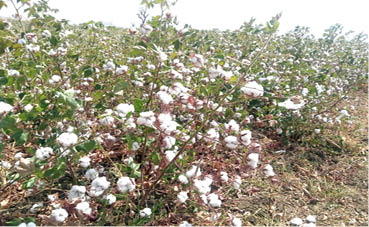Cotton production plummets to 40,000 tons
Cotton production and the quality of the crop are seriously deteriorating, with an estimated drop in production to 40,000 tons estimated for this year. Prof. Samuel Oloruntoba, Secretary, Cotton Ginners Association of Nigeria, stated this at the Annual Cotton Master Sample and Production meeting that was held at the Institute of Agricultural Research, IAR/ABU, Zaria. […]

cover daily
Cotton production and the quality of the crop are seriously deteriorating, with an estimated drop in production to 40,000 tons estimated for this year.
Prof. Samuel Oloruntoba, Secretary, Cotton Ginners Association of Nigeria, stated this at the Annual Cotton Master Sample and Production meeting that was held at the Institute of Agricultural Research, IAR/ABU, Zaria.
He said though there had been no reliable statistical data on production, but estimated production had varied between 60,000 and 120,000 tons in the last few years.
“There had been a continual decline in quality and quantity. This year, it is estimated that we may be going down to 40,000,” he said.
- Scarred children, broken systems: Nigeria’s betrayal of its future
- NSC chair, Dikko, emphasises school sports, plans excellence centres
In a paper presented titled ‘The Role of Government in Resuscitating the Cotton Sub-Sector in the Nigerian Economy: Update, Challenges and Prospects’, Prof. Oloruntoba said the sector used to be the second largest employer of labour boasting over 170 textile mills and 52 ginneries with an investment value in excess of $2 billion.
He, however, lamented that “Due to several external and internal factors, this sub-sector lost its place in the 80’s with most of the textile mills shut down and several ginneries closed down. Today, only about 22 ginneries are working and operating below 30 per cent of their installed capacities. Millions lost their jobs and cotton farmers shifted to other crops,” he stated.
Oloruntoba, who is also the general manager of a cotton ginning firm, advocated the setting up of a high-powered committee under the Presidency to include all stakeholders to come up with a workable, implementable road map for the resuscitation of the sector within five years.
Earlier, Prof. Ado Yusuf, Executive Director of the Institute of Agricultural Research, IAR/ABU, Zaria, urged the federal government to improve the national cotton product utilisation internally and grant further stimulus by shelving undue external distraction.
Prof. Yusuf said, “In order to enhance quality research and output in cotton production, the institute has purchased modern equipment such as Fibro Graph, Torsion Balance and Comb Sorter for measuring fibre length and strength.
“The institute’s effort is also geared towards raising the level of cotton generic recombination through increased hybridisation and selection.
“Additionally, deliberate effort is also being made to bring the institute closer to industry players, cotton seed companies, lint utilisers, textile mills, and environment-related issues to support cotton production and utilisation,” he stated.
The executive director noted that currently the institute is collaborating with an Indian firm, Mahyco, Seed Work Ptv, and Fiyah Global Concept in the evaluation of more BT cotton hybrids for registration and release in Nigeria very soon.
Prof. David Idoko Adekwe, Programme Leader Cotton Research of IAR, said this year’s Master Sample Meeting is targeting the revival of the gazetted Cotton Market Board, which is responsible for the pricing of the commodity, so that cotton farmers will have value for their money.
